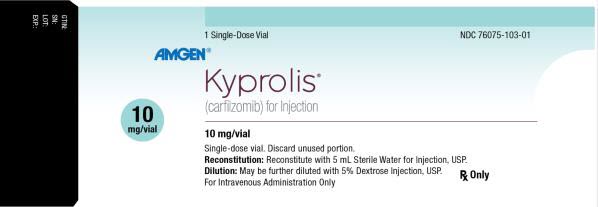Carfilzomib
Generic name: carfilzomib
Brand name: Kyprolis
Dosage form: intravenous (infusion) injection
Drug class: Proteasome inhibitors
Medically reviewed by A Ras MD.
What is carfilzomib?
Carfilzomib is used to treat multiple myeloma. Carfilzomib may be given to you for other reasons.
If you have just been diagnosed with multiple myeloma and cannot have a transplant, talk with your doctor. A study showed that these patients taking carfilzomib with certain other drugs (melphalan and prednisone) had more very bad and sometimes deadly side effects compared to a certain other drug.
Description
Carfilzomib is a proteasome inhibitor. The chemical name for carfilzomib is (2S)-N-((S)-1-((S)-4-methyl-1-((R)-2-methyloxiran-2-yl)-1-oxopentan-2-ylcarbamoyl)-2-phenylethyl)-2-((S)-2-(2-morpholinoacetamido)-4-phenylbutanamido)-4-methylpentanamide. Carfilzomib has the following structure:

Carfilzomib is a crystalline substance with a molecular weight of 719.9. The molecular formula is C40H57N5O7. Carfilzomib is practically insoluble in water and very slightly soluble in acidic conditions.
Kyprolis for injection, for intravenous use is a sterile, white to off-white lyophilized powder in a single-dose vial. Each 10 mg vial contains 10 mg of carfilzomib, 500 mg sulfobutylether beta-cyclodextrin, and 9.6 mg anhydrous citric acid and sodium hydroxide for pH adjustment (target pH 3.5). Each 30 mg vial contains 30 mg of carfilzomib, 1500 mg sulfobutylether beta-cyclodextrin, and 28.8 mg anhydrous citric acid and sodium hydroxide for pH adjustment (target pH 3.5). Each 60 mg vial contains 60 mg of carfilzomib, 3000 mg sulfobutylether beta-cyclodextrin, 57.7 mg citric acid, and sodium hydroxide for pH adjustment (target pH 3.5).
Mechanism of Action
Carfilzomib is a tetrapeptide epoxyketone proteasome inhibitor that irreversibly binds to the N-terminal threonine-containing active sites of the 20S proteasome, the proteolytic core particle within the 26S proteasome. Carfilzomib had antiproliferative and proapoptotic activities in vitro in solid and hematologic tumor cells. In animals, carfilzomib inhibited proteasome activity in blood and tissue and delayed tumor growth in models of multiple myeloma, hematologic, and solid tumors.
Before taking carfilzomib, tell your doctor:
- If you are allergic to carfilzomib; any part of this medicine; or any other drugs, foods, or substances. Tell your doctor about the allergy and what signs you had.
- If you have high blood pressure.
- If you are pregnant or may be pregnant. Women must use birth control while taking carfilzomib and for some time after the last dose. Ask your doctor how long to use birth control. If you get pregnant, call your doctor right away.
- If you are a man with a partner who may get pregnant. Use birth control while taking carfilzomib and for some time after the last dose. Ask your doctor how long to use birth control. If your partner gets pregnant, call the doctor right away.
- If you are breast-feeding. Do not breast-feed while you take carfilzomib and for 2 weeks after your last dose.
This is not a list of all drugs or health problems that interact with carfilzomib.
Tell your doctor and pharmacist about all of your drugs (prescription or OTC, natural products, vitamins) and health problems. You must check to make sure that it is safe for you to take carfilzomib with all of your drugs and health problems. Do not start, stop, or change the dose of any drug without checking with your doctor.
What are some things I need to know or do while I take carfilzomib?
- Tell all of your health care providers that you take carfilzomib. This includes your doctors, nurses, pharmacists, and dentists.
- Avoid driving and doing other tasks or actions that call for you to be alert until you see how carfilzomib affects you.
- Severe and sometimes deadly bleeding problems have happened with carfilzomib.
- Death caused by heart attack has happened within a day of getting carfilzomib. Talk with your doctor.
- A very bad and sometimes deadly brain problem called posterior reversible encephalopathy syndrome (PRES) has happened with carfilzomib. Call your doctor right away if you have signs like feeling confused, lowered alertness, change in eyesight, loss of eyesight, seizures, or very bad headache.
- Very bad and sometimes deadly blood problems like thrombotic thrombocytopenic purpura/hemolytic uremic syndrome (TTP/HUS) have happened with carfilzomib in some people. Call your doctor right away if you feel very tired or weak or have any bruising or bleeding; dark urine or yellow skin or eyes; pale skin; change in the amount of urine passed; change in eyesight; change in strength on 1 side is greater than the other, trouble speaking or thinking, or change in balance; or fever.
- Patients with cancer who take carfilzomib may be at a greater risk of getting a severe health problem called tumor lysis syndrome (TLS).This may lead to death. Call your doctor right away if you have a fast or abnormal heartbeat; any passing out; trouble passing urine; muscle weakness or cramps; upset stomach, throwing up, diarrhea, or not able to eat; or feel sluggish.
- Heart failure has happened with carfilzomib, as well as heart failure that has gotten worse in people who already have it. Tell your doctor if you have heart disease. Call your doctor right away if you have shortness of breath, a big weight gain, a heartbeat that is not normal, or swelling in the arms or legs that is new or worse.
- Infusion reactions have happened with carfilzomib. Sometimes, these could be very bad or life-threatening. Talk with the doctor.
- Infusion reactions can happen up to 24 hours after carfilzomib is given.
- High blood pressure has happened with carfilzomib. Sometimes, this has been deadly. Have your blood pressure checked as you have been told by your doctor.
- Tell your doctor if you have signs of high blood sugar like confusion, feeling sleepy, more thirst, more hungry, passing urine more often, flushing, fast breathing, or breath that smells like fruit.
- Very bad and sometimes deadly lung, liver, or kidney problems have happened with carfilzomib. Talk with your doctor.
- This medicine may affect fertility. Fertility problems may lead to not being able to get pregnant or father a child.
- If you are 65 or older, use carfilzomib with care. You could have more side effects.
- This medicine may cause harm to an unborn baby. A pregnancy test will be done before you start carfilzomib to show that you are NOT pregnant.
How is carfilzomib best taken?
Use carfilzomib as ordered by your doctor. Read all information given to you. Follow all instructions closely.
- It is given as an infusion into a vein over a period of time.
- You will need to be sure that you are not dehydrated before getting carfilzomib. Check with your doctor to see if you need to drink extra fluids before getting carfilzomib.
- Drink lots of noncaffeine liquids unless told to drink less liquid by your doctor.
- If you have upset stomach, throwing up, diarrhea, or are not hungry, talk with your doctor. There may be ways to lower these side effects.
- Other drugs may be given to help with infusion side effects.
- Have blood work checked as you have been told by the doctor. Talk with the doctor.
- You may have more chance of getting an infection. Wash hands often. Stay away from people with infections, colds, or flu.
- You may bleed more easily. Be careful and avoid injury. Use a soft toothbrush and an electric razor.
What do I do if I miss a dose?
- Call your doctor to find out what to do.
What are the side effects of carfilzomib that I need to call my doctor about immediately?
WARNING/CAUTION: Even though it may be rare, some people may have very bad and sometimes deadly side effects when taking a drug. Tell your doctor or get medical help right away if you have any of the following signs or symptoms that may be related to a very bad side effect:
- Signs of an allergic reaction, like rash; hives; itching; red, swollen, blistered, or peeling skin with or without fever; wheezing; tightness in the chest or throat; trouble breathing, swallowing, or talking; unusual hoarseness; or swelling of the mouth, face, lips, tongue, or throat.
- Signs of infection like fever, chills, very bad sore throat, ear or sinus pain, cough, more sputum or change in color of sputum, pain with passing urine, mouth sores, or wound that will not heal.
- Signs of kidney problems like unable to pass urine, change in how much urine is passed, blood in the urine, or a big weight gain.
- Signs of liver problems like dark urine, feeling tired, not hungry, upset stomach or stomach pain, light-colored stools, throwing up, or yellow skin or eyes.
- Signs of lung or breathing problems like shortness of breath or other trouble breathing, cough, or fever.
- Signs of high blood pressure like very bad headache or dizziness, passing out, or change in eyesight.
- Signs of electrolyte problems like mood changes, confusion, muscle pain or weakness, a heartbeat that does not feel normal, seizures, not hungry, or very bad upset stomach or throwing up.
- Signs of bleeding like throwing up or coughing up blood; vomit that looks like coffee grounds; blood in the urine; black, red, or tarry stools; bleeding from the gums; abnormal vaginal bleeding; bruises without a cause or that get bigger; or bleeding you cannot stop.
- A burning, numbness, or tingling feeling that is not normal.
- Muscle or joint pain.
- Flushing.
- Call your doctor right away if you have signs of a blood clot like chest pain or pressure; coughing up blood; shortness of breath; swelling, warmth, numbness, change of color, or pain in a leg or arm; or trouble speaking or swallowing.
What are some other side effects of carfilzomib?
All drugs may cause side effects. However, many people have no side effects or only have minor side effects. Call your doctor or get medical help if any of these side effects or any other side effects bother you or do not go away:
- Diarrhea or constipation.
- Not hungry.
- Feeling dizzy, tired, or weak.
- Muscle spasm.
- Back pain.
- Headache.
- Trouble sleeping.
- Upset stomach or throwing up.
- Signs of a common cold.
These are not all of the side effects that may occur. If you have questions about side effects, call your doctor. Call your doctor for medical advice about side effects.
You may report side effects to the FDA at 1-800-332-1088. You may also report side effects at https://www.fda.gov/medwatch.
If overdose is suspected:
If you think there has been an overdose, call your poison control center or get medical care right away. Be ready to tell or show what was taken, how much, and when it happened.
How do I store and/or throw out carfilzomib?
- If you need to store carfilzomib at home, talk with your doctor, nurse, or pharmacist about how to store it.
Label
PRINCIPAL DISPLAY PANEL
- 1 Single-Dose Vial
NDC 76075-103-01
AMGEN®
Kyprolis®
(carfilzomib) for Injection
10 mg/vial
10 mg/vial
Single-dose vial. Discard unused portion.
Reconstitution: Reconstitute with 5 mL Sterile Water for Injection, USP. - Dilution: May be further diluted with 5% Dextrose Injection, USP.
- For Intravenous Administration Only
Rx Only

SRC: NLM .
